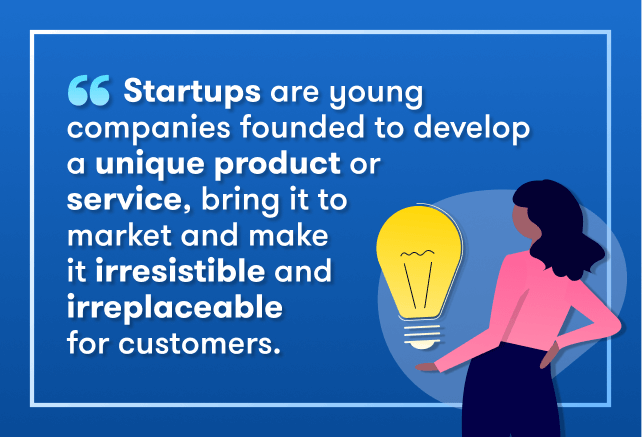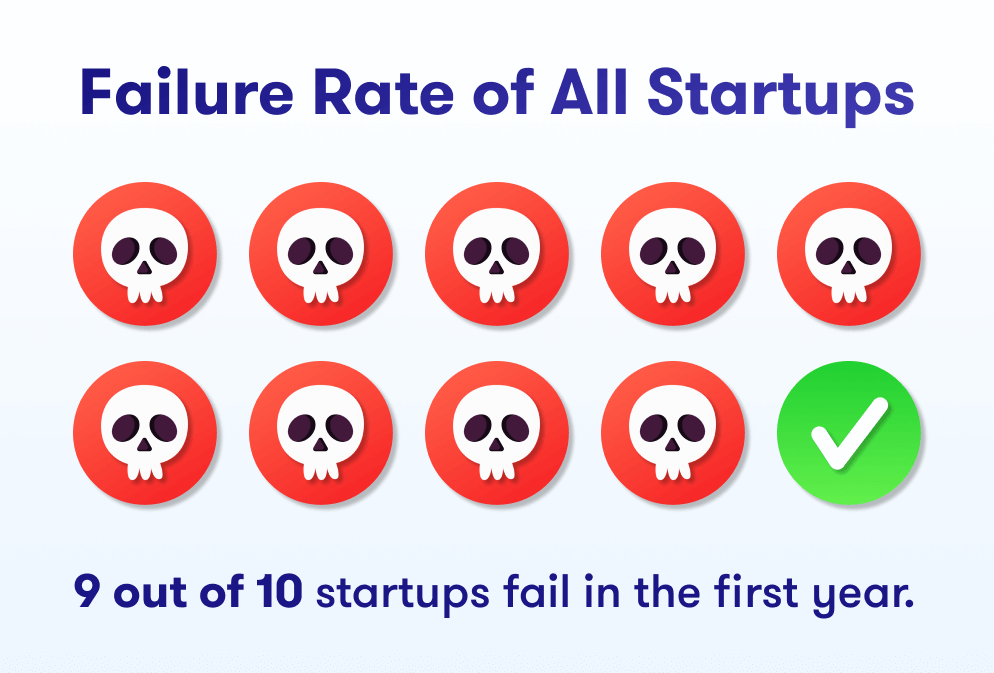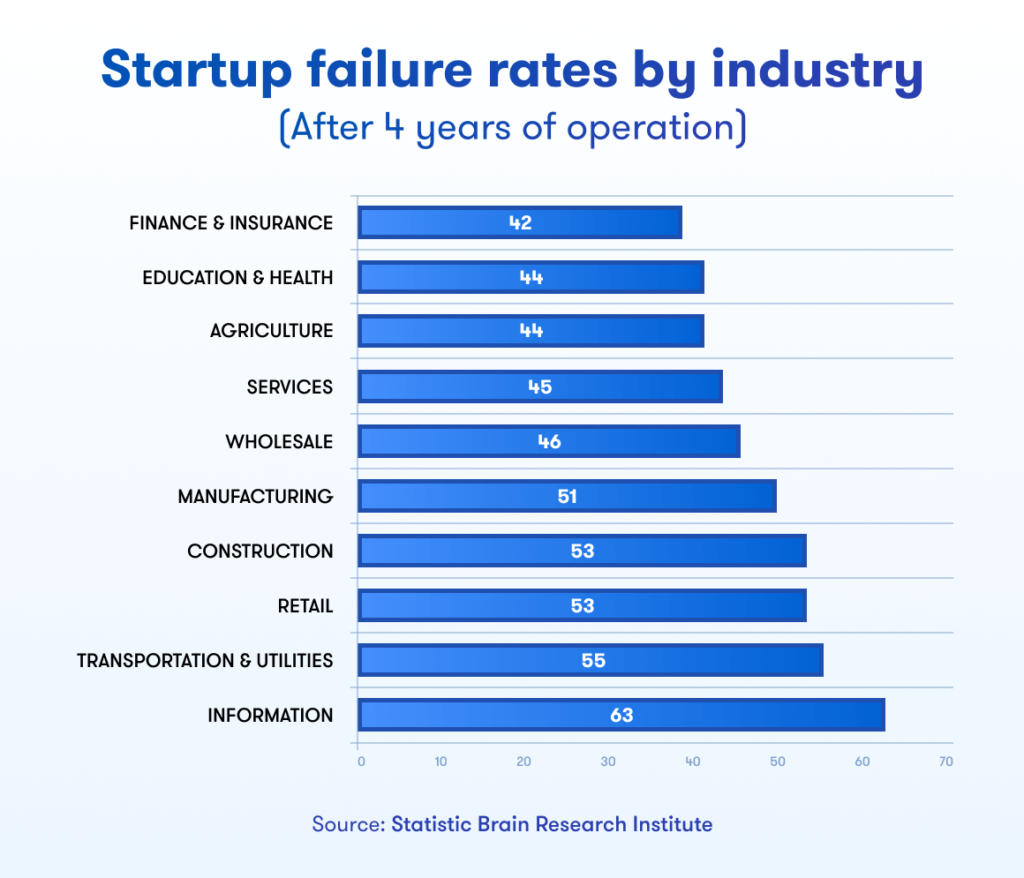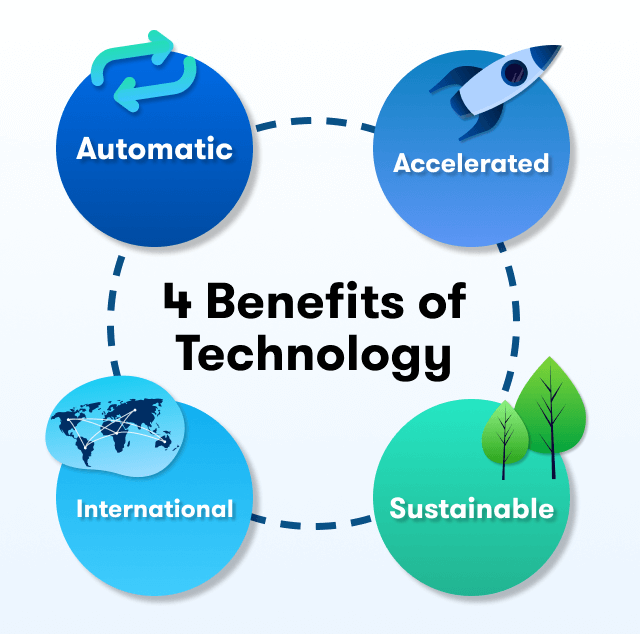Is It Necessary To Discuss Technology Development In Startups Now?
Blog Categories:
Published:
May 15, 2023
Reading Time:
9 minutes

It's 2023 now, and we still need to stress the importance of technology development in startups. Last year, approximately 5 million new businesses were born. Undoubtedly, startups are competing fiercely to stay in customers' minds. To win this battle, young companies need help from the most fantastic armor of technology.
Honestly, you must be bored by dozens of posts saying, "You need to use technology now." Today, let's dive deeper into how technology REALLY transforms startups, and what you can do to succeed with every software.
Honestly, you must be bored by dozens of posts saying, "You need to use technology now." Today, let's dive deeper into how technology REALLY transforms startups, and what you can do to succeed with every software.
I. The competition between startups
The 21st century is witnessing the rise of startups. A startup is born when people see a need for innovation in the market. According to Forbes:

Nowadays, everyone can be their own boss and open a business from home computers. Take the example of the USA, the country with the most startups. On average, starting a new company in the US takes only six days. In total, more than 30 million small businesses are running in the US in 2022, covering every demand of consumers.
The startup waves have positively influenced shoppers since we now have more options to fulfill our needs rather than relying solely on colossal corporations. Thanks to the Internet, customers and businesses are getting closer, yet it also poses multiple threats, especially to uniqueness.
How does a young business stand out among hundreds of competitors trying to sell the same thing as them?

Out of TEN startups, NINE fail. Even if they survive past the first year, 70% still die in years two to five. These high rates come from a combination of factors, varying from running out of investments, losing to other competitors, or lacking market demand.

Yet entrepreneurs don't give up. Every day, thousands of people are mesmerized by the prospect of achieving success on their own. Therefore, it is imperative that they prepare well in order to complete this challenging quest. What's better than technology's magic?

Nowadays, everyone can be their own boss and open a business from home computers. Take the example of the USA, the country with the most startups. On average, starting a new company in the US takes only six days. In total, more than 30 million small businesses are running in the US in 2022, covering every demand of consumers.
The startup waves have positively influenced shoppers since we now have more options to fulfill our needs rather than relying solely on colossal corporations. Thanks to the Internet, customers and businesses are getting closer, yet it also poses multiple threats, especially to uniqueness.
How does a young business stand out among hundreds of competitors trying to sell the same thing as them?

Out of TEN startups, NINE fail. Even if they survive past the first year, 70% still die in years two to five. These high rates come from a combination of factors, varying from running out of investments, losing to other competitors, or lacking market demand.

Yet entrepreneurs don't give up. Every day, thousands of people are mesmerized by the prospect of achieving success on their own. Therefore, it is imperative that they prepare well in order to complete this challenging quest. What's better than technology's magic?
KEY TAKEAWAYS
- Millions of businesses launch yearly, and surviving in the ever-changing market is a matter of life and death.
II. Once again, the benefits of technology development in startups
In unicorn startups (those values reach over $1 billion) like Uber and Airbnb, technology is their golden horn. Automation, smart learning, and artificial intelligence have turned tasks that were impossible in the past into reality. Ten years ago, it would be crazy to think a virtual assistant could renovate the customer service industry.
Therefore, everyone runs to the latest software to avoid rivals' surpassing, as 44% of companies are ready to increase IT spending in 2023. The secret behind this favoritism can be summarized in 4 words: Automatic, Accelerated, International, and Sustainable.

Automatic: Technology's most beloved characteristic lies in its ability to complete tasks independently. This significantly helps young startups, who have small capital, cut human resources costs as well as eliminate repetitive tasks. This allows them to focus on other aspects of building the company.
Accelerated: Thanks to automation and deep learning, machines work faster with near-zero errors. For example, ChatGPT makes writing tasks less burdensome: Give it a brief, and ChatGPT can produce a decent paragraph based on your input. Although there is room for improvement, with technology's support, nearly 60% of workers believe they can save up to 6 working hours a week. This is equivalent to almost a typical working day.
International: The Internet erases the nation’s borderline in shopping. Technology facilitates international purchases since buyers can connect with providers from different parts of the world and choose the most suitable one. Forbes predicts that in 2023, 20.8% of retail shopping will happen online.
Sustainable: Thousands of software programs are developed annually to support various segments of businesses. Whether you're a multi-national enterprise or a one-day-olds brand, there will be an online app to be your ally. Because of the scalability of a cloud-based system, a handful of software can follow you on a long journey or transform themself into a more robust application to support business growth. The software would become the most effective bargain if companies learned how to optimize it. With their massive advantages, technology can be the sharpest weapon at every step of startup development and customer journey, including but not limited to:
Businesses combine multiple advancements to track and find the pain points of their targeted customers, then generate a report suggesting what to do to fulfill the gap. Software like a project management system can calculate the number of employees and budget you need to bring the idea out of paper. Rather than drawing by hand, the product team can design the interface in apps such as Figma and have others comment until they reach perfection.
Read More: 15 Technology Investments Every Startup Should Make

Automatic: Technology's most beloved characteristic lies in its ability to complete tasks independently. This significantly helps young startups, who have small capital, cut human resources costs as well as eliminate repetitive tasks. This allows them to focus on other aspects of building the company.
Accelerated: Thanks to automation and deep learning, machines work faster with near-zero errors. For example, ChatGPT makes writing tasks less burdensome: Give it a brief, and ChatGPT can produce a decent paragraph based on your input. Although there is room for improvement, with technology's support, nearly 60% of workers believe they can save up to 6 working hours a week. This is equivalent to almost a typical working day.
International: The Internet erases the nation’s borderline in shopping. Technology facilitates international purchases since buyers can connect with providers from different parts of the world and choose the most suitable one. Forbes predicts that in 2023, 20.8% of retail shopping will happen online.
Sustainable: Thousands of software programs are developed annually to support various segments of businesses. Whether you're a multi-national enterprise or a one-day-olds brand, there will be an online app to be your ally. Because of the scalability of a cloud-based system, a handful of software can follow you on a long journey or transform themself into a more robust application to support business growth. The software would become the most effective bargain if companies learned how to optimize it. With their massive advantages, technology can be the sharpest weapon at every step of startup development and customer journey, including but not limited to:
- Create a short bridge for both external and internal communication.
- Reach more potential customers by using more modern and interactive marketing activities.
- Simplify management processes for labor, inventory, and financial tasks.
- Improve customer satisfaction by offering 24/7 global support.
- Enhance sales performance with thorough market and consumer analysis.
Businesses combine multiple advancements to track and find the pain points of their targeted customers, then generate a report suggesting what to do to fulfill the gap. Software like a project management system can calculate the number of employees and budget you need to bring the idea out of paper. Rather than drawing by hand, the product team can design the interface in apps such as Figma and have others comment until they reach perfection.
Read More: 15 Technology Investments Every Startup Should Make
III. What led to the split between startups and technology?
However, many young brands are reluctant to apply technology to their performance, as it has yet to deliver what is promised. Below are four main obstacles preventing startups from using technology.
Lack of investment
Startups often say no to technology due to money issues. They prioritize other essential tasks, as technology is just the "icing on the cake": The budget is allocated to storage, marketing activities, and human resources. In some circumstances, the startup is a one-man band, so using technology seems to be a fancy dream. They can utilize free software, yet the impact is not too visible.
Software options and maintenance
In some worse cases, startups pick the wrong technology for their operation. They have the capital to expand, but their application choices hinder them. This problem falls into three categories: Wrong, Outdated, and Inconsistent usage.Some companies choose ineffective software due to a lack of research. Others refuse to upgrade their system since there's no investment or they're afraid of changes. In contrast, impulsive brands tend to follow trends blindly. Whenever they hear there is new tech in town, multiple startups are led by the media to believe it is a must-have item, then realize it cannot contribute to their current business. Therefore, it is vital to have a team of consultants who understand the assignments to support you.
Moreover, young companies fail to maintain machine performance. When they reach the "saturation point" with the technology, they discard the app and replace it with something new entirely instead of finding a way to maximize its features. This is one of the causes of the following problem.
Inexperienced staff
Getting used to the latest technology takes time. Even teenagers, the majority of savvy device users, find new functions on their phones daily. Smartphones are the easy part compared to business software. Thereby, having competent employees knowing how to run them is the base for long-term success.However, this is not familiar to startups. Not every owner has the time and patience to train staff thoroughly through every step of the app; it relies heavily on each person's learning capabilities. Furthermore, the unstable state of using technology also causes challenges for workers. Having too many systems, insisting on ancient software, or constantly changing multiple apps is a nightmare for young users.
Ignorance of trends
In the 4.0 era, if a business cannot read the trends, they already have one foot out the door. Technology applications can turn the whole operation upside down, so it's up to you to go "up" or "down." However, startups are usually drowned in a sea of software and unable to see the right direction for their business.Misreading consumers' behaviors accounts for 42% of failed cases in running a new business. Companies may be aware of the changes yet deliberately ignore them, thinking, "We won't be late." By the time they see the advancement's importance, other opponents have been one step ahead.
IV. How to take advantage of technology developments in startups
At this point, we won't say startups need to use technology. It's up to you to decide which is best based on your needs.
However, we want to emphasize that technology can be the key to opening the door to success, as what separates victorious startups lies in their advanced processes. Therefore, we will unveil several noteworthy tips to help you overcome technology development challenges.
To begin with, you must understand the demand of your market and the target audience's shopping habits. Knowing these elements will help you determine the most crucial part of applying technology for startups: What software you actually need.
Next, being aware of your requirements affects all business aspects. Owners can plan ahead which apps are required at each stage, thus allocating the proper budget. This ensures sustainable growth and prepares you for a long journey.
Finally, it would help if you listened to the true experts to avoid messing up due to misreading the market. Refrain from following online advice recklessly since each business has unique traits and conditions. You can consult those who understand your niche and adjust your plan carefully to adjust to the market.


Final words: We hope that through the article, you're convinced that, whether big or small-scale, it's vital for a business to understand the technology they're using. There are endless possibilities, and this can be the free pass to run your business better.
Guidance is necessary to avoid running into dead ends while applying these advancements to your operation. You can rely on advice from experts in the field, and Consultport can provide you with both experience and practical approaches to supporting your business growth. We can recommend what young and potential businesses need to succeed, such as digitization and CRM consultants, thus taking a ton out of your budget.
However, we want to emphasize that technology can be the key to opening the door to success, as what separates victorious startups lies in their advanced processes. Therefore, we will unveil several noteworthy tips to help you overcome technology development challenges.
To begin with, you must understand the demand of your market and the target audience's shopping habits. Knowing these elements will help you determine the most crucial part of applying technology for startups: What software you actually need.
Next, being aware of your requirements affects all business aspects. Owners can plan ahead which apps are required at each stage, thus allocating the proper budget. This ensures sustainable growth and prepares you for a long journey.
Finally, it would help if you listened to the true experts to avoid messing up due to misreading the market. Refrain from following online advice recklessly since each business has unique traits and conditions. You can consult those who understand your niche and adjust your plan carefully to adjust to the market.

V. 8 Necessary advanced tools for new-born companies
For those who have decided to apply technology to their operation, we gladly introduce you to eight of the most needed software to boost your startup's performance. These apps can scale with your expansion and be the foundation for further development.- Customer relationship management - CRM software
- Inventory management software
- Project management software

- Human resource management - HRM software
- Financial management tools
- Security software
- Mobile apps
- Cloud service
Final words: We hope that through the article, you're convinced that, whether big or small-scale, it's vital for a business to understand the technology they're using. There are endless possibilities, and this can be the free pass to run your business better.
Guidance is necessary to avoid running into dead ends while applying these advancements to your operation. You can rely on advice from experts in the field, and Consultport can provide you with both experience and practical approaches to supporting your business growth. We can recommend what young and potential businesses need to succeed, such as digitization and CRM consultants, thus taking a ton out of your budget.
Share This Story, Choose Your Platform!



